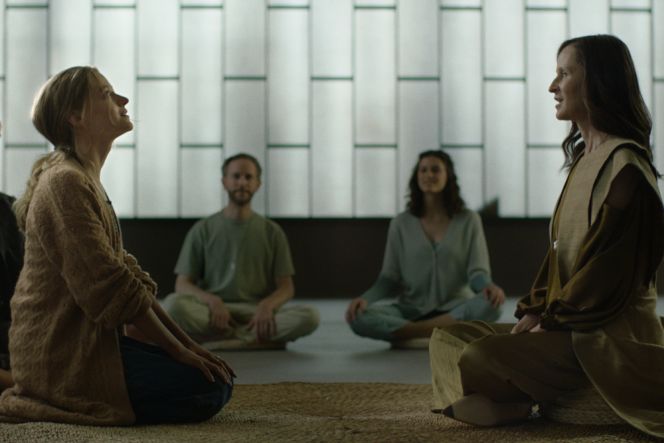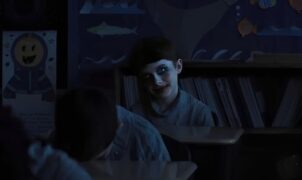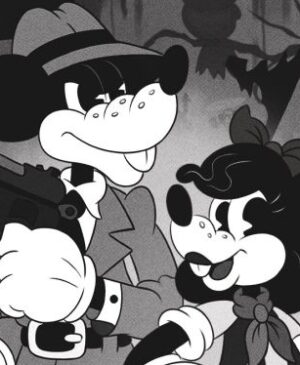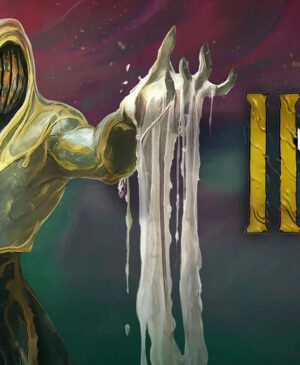SERIES REVIEW – Jordan Scott’s second feature film, Sacrifice, now streaming on Max, tells the gripping story of an American social psychologist and his rebellious teenage daughter as they face a perilous summer in Berlin. At the heart of the narrative is a sinister cult threatening both father and daughter while they each wrestle with their own internal struggles. Despite its striking visuals, the film’s storytelling stumbles at times, losing clarity and failing to fully explore its intriguing premise. In the end, Sacrifice is a film that impresses with its style but falls short in emotional complexity.
Ben Monroe (Eric Bana), a social psychologist and author of the bestseller The Science of Loneliness, arrives in Berlin to take up a guest lecturing post while working on his next book, The Power of Groupthink. However, his time in Germany is complicated by his wife’s decision to initiate a trial separation, sending their teenage daughter Mazzy (Sadie Sink) to spend the summer with him as a form of “punishment.” While Ben is far from thrilled with this arrangement, Mazzy quickly finds her stay more interesting than expected after meeting Martin (Jonas Dassler), a charming local boy.
Martin, however, has a hidden agenda. He swiftly earns Mazzy’s trust and introduces her to an enigmatic eco-spiritual group. What starts as an exciting adventure for Mazzy soon reveals itself to be an apocalyptic cult. Led by the unnervingly charismatic Hilma (Sophie Rois), the group pressures its members to abandon all “worldly attachments” in the name of planetary healing and purification.
Drawn into the Cult
While the film is titled Sacrifice, it is loosely based on Nicholas Hogg’s novel Tokyo, which is set in the Japanese capital. It’s clear that Jordan Scott, known primarily for her career in directing commercials, took significant liberties with the source material. Her first feature, the 2009 boarding school drama Cracks—produced by her father, Ridley Scott—showcased her strong visual style, but it, too, suffered from narrative weaknesses. At first, Sacrifice appears to mix elements of a crime drama with the action-thriller tone of Taken, only to deviate from this path as the story progresses.
Mazzy’s involvement with Martin leads her into the heart of a manipulative cult, while Ben struggles with his own challenges. The academic starts to piece together the dangerous connections surrounding the cult when his colleague Max (Stephan Kampwirth) points him toward suspicious activity. Additional insights come from Nina (Sylvia Hoeks), a profiler specializing in dangerous criminals. As Mazzy sinks deeper into Martin’s world, Ben becomes ensnared in his own web of manipulation. Ultimately, the story builds toward a grand conspiracy, though it fails to deliver the kind of surprises or credibility that could elevate the narrative.
Sacrifice or Manipulation?
Hilma’s mantra, “redemption through sacrifice,” is chillingly literal, as the cult orchestrates a string of ritual suicides. Mazzy’s descent into the cult’s ideology parallels Ben’s attempts to untangle the web of deceit surrounding Hilma and her followers. Yet, for all its potential, the film struggles to provide the emotional depth or character motivations needed to make the stakes feel genuine. The antagonists often verge on caricature, while the protagonists fail to leave a lasting impression. Even as the pacing quickens and the stakes escalate, the film never achieves the tension it seems to strive for.
Jordan Scott proves adept at drawing strong performances from her cast, and Sacrifice is visually stunning, with Julie Kirkwood’s cinematography and Volker Bertelmann’s evocative score creating moments of real beauty. However, these strengths aren’t enough to compensate for the lack of narrative cohesion or character depth. The cult’s philosophies remain shallowly explored, leaving the audience with more questions than answers. Ultimately, the film feels like a collection of striking visuals without the emotional or intellectual foundation to support them.
Magical Realism or Just an Illusion?
Scott has described Sacrifice as a “magical realist thriller,” a claim that suggests a more abstract, symbolic approach. While such a tone might have masked the plot holes and thematic shortcomings, what the film delivers is a polished yet ultimately hollow genre piece. It begins with promise but drifts into a conceptual fog, lacking the mystique and intensity needed to turn its flaws into assets.
This shortcoming is particularly disappointing given the talent involved. Kirkwood’s cinematography and Bertelmann’s music offer glimpses of the enigmatic duality the film aspires to but never fully achieves. While certain moments stand out, the overall execution is uneven. In the end, Sacrifice is a visually impressive film that struggles to deliver the emotional resonance or narrative impact its premise deserves.
-Herpai Gergely “BadSector”-
Sacrifice
Direction - 6.6
Actors - 6.8
Story - 7.1
Visuals/Music/Sounds - 7.4
Ambience - 6.8
6.9
FAIR
Sacrifice excels in its visual execution and stylistic choices but falters where it truly counts. The characters lack depth, the tension never fully materializes, and the narrative fails to fulfill its initial promise. While the film occasionally captivates, it ultimately loses momentum, leaving behind a thriller that is as beautiful as it is hollow.


















Leave a Reply